Top 8 International eCommerce Platforms in 2024

Updated by March 18,2024
With online shopping increasing by leaps and bounds, it's no wonder that more and more people believe they can get better deals when they shop online. According to nChannel, 71% of shoppers say they get better deals when shopping online - so if you're looking to save some money, it's definitely worth checking out your favorite stores' websites!
As an online seller, your primary objective is to find a reliable e-commerce platform to help you establish your business in the best possible way. While there are several e-commerce platforms available, you need to choose the right one that is right for your business. Here is a list of the top 8 international e-commerce platforms in 2024.
How to Choose the Best eCommerce Platform
Here are 7 things you must keep in mind while picking an eCommerce Platform. Take a look.
1. Size & Scope of Your Business
First, consider the size and scope of your business. If you're a small business, you'll want to choose a platform that's easy to use and doesn't require a lot of technical expertise. If you're a larger business, you'll need a platform that's scalable and can handle a lot of traffic.
2. Security
Security is one of the most important factors to consider when choosing an ecommerce platform. Data breaches are becoming more and more common, and if your platform is not secure, your customers' information could be at risk. Make sure to choose a platform that uses the latest security technologies and has a strong track record of keeping data safe.
3. User-Experience
The user experience is one of the most significant factors to consider when selecting an ecommerce platform. A good user experience will make it easy for customers to find the products they are looking for, add items to their shopping cart, and checkout quickly and easily.
A bad user experience will frustrate customers and may cause them to abandon their shopping carts altogether. Therefore, it is essential to decide an ecommerce platform that is user-friendly and offers a smooth and seamless shopping experience.
4. Integration Abilities
The ability to integrate with other systems is essential for any business that wants to scale and grow. Without integration, businesses would be siloed and unable to take advantage of the many benefits that come with being able to connect to other systems.
Some of the most important benefits of integration include:
- The ability to connect to multiple systems and share data
- The ability to automate tasks and processes
- The ability to connect to new markets and customers
All of these benefits are essential for businesses that want to grow and scale. Without integration, businesses would be at a serious disadvantage.
5. Ability to Handle Multiple Payment Methods
Platforms that can only accept a limited number of payment methods may not be able to accommodate the needs of all customers, which could limit sales.
| Get Started Now to Grow Your Online Business with the Best AliExpress Dropshipping Tool - DSers! |
On the other hand, platforms that offer a wide variety of payment options can make it easier for customers to complete a purchase, which could lead to increased sales. Therefore, the ability to handle multiple payment methods is an important factor to consider when choosing an ecommerce platform.
6. Customization
A platform that is highly customizable will allow you to create a unique online store that reflects your brand and meets the specific needs of your customers. A platform with limited customization options may limit your ability to create a truly unique online experience for your customers.
In addition, a customizable platform will allow you to add new features and functionality as your business grows, ensuring that your store always meets the changing needs of your business.
7. Customer Support
Platforms with good customer support can help you with any problems you have with setting up your store, managing orders, and more. They can also help you troubleshoot any issues you have with your website or products. Having a platform with good customer support can save you a lot of time and hassle, and it can make your online store more successful.
Top 8 International eCommerce Platforms for 2024
1. Wix
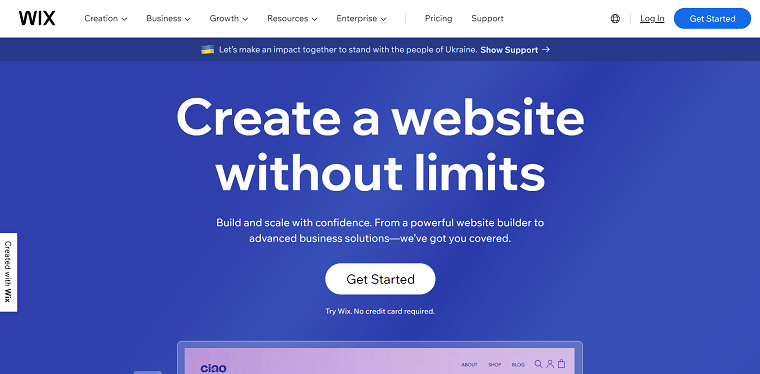
Wix is one of the easiest eCommerce platforms to use, providing simple alternatives to building a full website with serverless computing and hassle-free coding. It's the best fit for brand new online stores, with affordable pricing, 72 free themes, and a very simple setup.
- Easy to use
- A wide array of templates
- Many options for customizability
- Weak system of support
- Doesn't aid businesses who sell things in large or wholesale quantities.
2. Shopify

Shopify is a popular platform for building online stores and is likely to remain so in 2024. Shopify offers a range of features to help you manage your store, including tools for payment processing, shipping, and marketing.
- Wide range of payment integration options
- Ease of use
- Great customer support
- Transaction fee on each sale
- Limited control over server resources
3. WooCommerce
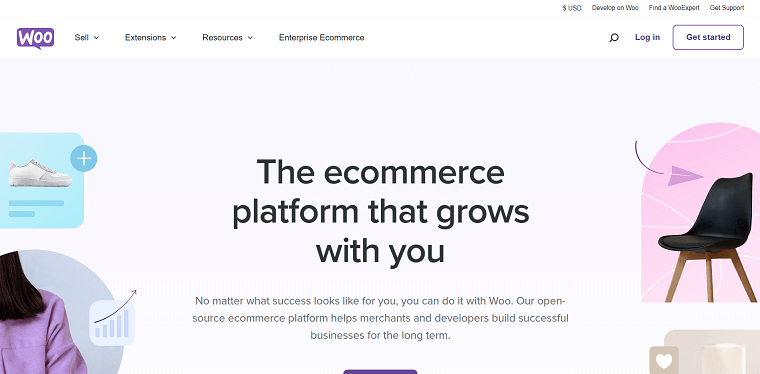
WooCommerce is a popular plugin for creating an online store using the WordPress content management system. It offers a range of features to help you manage your store, including tools for payment processing, shipping, and marketing. Though it’s a plug-in, It has a large user base and a strong community of developers,
- Integrates seamlessly with the WordPress
- Strong community support
- A wide range of customization options
- Dependence on WordPress
- Initial setup and configuration can be complex
- Compatibility issues with WordPress themes
4. Adobe Commerce
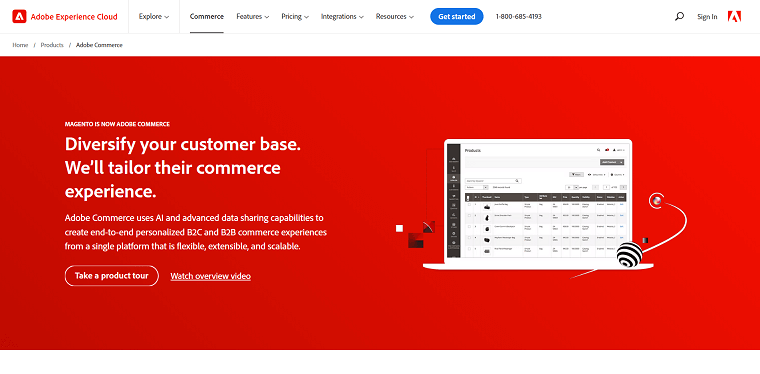
Adobe Commerce is an e-commerce platform that offers a range of tools and features to help businesses create and manage online stores. It provides support for a wide range of payment gateways and shipping options, as well as marketing and analytics tools to help businesses grow their online presence.
- It comes with more scalability
- Strong Security
- Excellent Customer Support
- A bit complex with a wide range of features
- It’s more expensive
- Compatibility issues with other Adobe Products
5. Nexcess
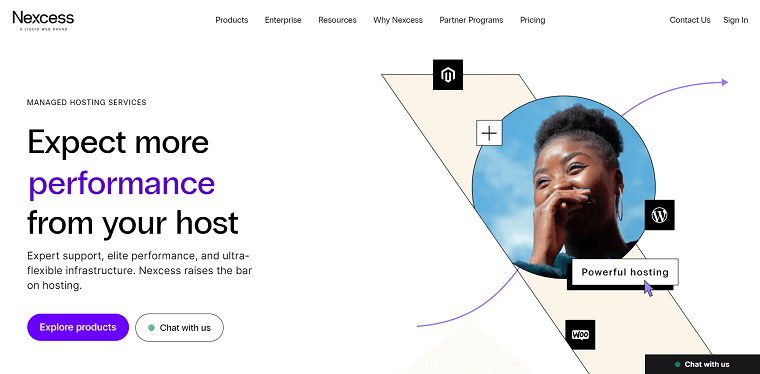
Nexcess is a managed hosting provider that offers a range of hosting solutions for websites and e-commerce stores. The company was founded in 2000 and is headquartered in Southfield, Michigan.
Nexcess offers a range of hosting plans for different needs, including shared hosting, cloud hosting, and dedicated servers. It also offers specialized hosting solutions for popular content management systems such as WordPress and Magento.
- Expert customer support
- Reliable & Secure
- Range of services
- May be more expensive than other options
- Designed to work with specific hosting options
- Limited support for third-party integrations
6. Zyro
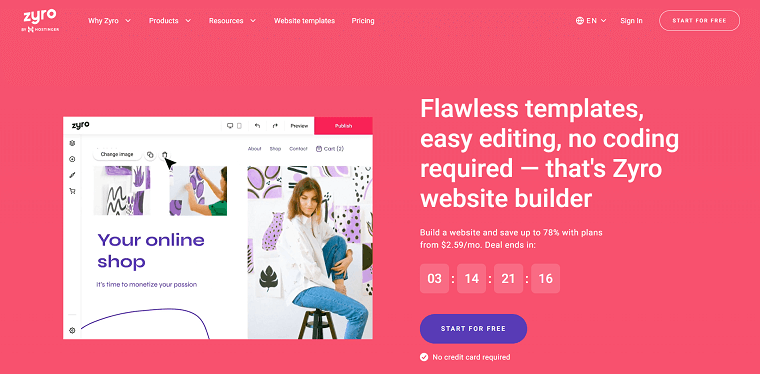
Zyro is another website builder platform that allows users to create professional-looking websites without the need for coding skills. It offers a range of templates, design tools, and features to help users create a website that reflects their brand and meets their needs.
- Create responsive designs
- Built-in Ecommerce tools
- SEO-friendly
- Limited customization options
- Limited Scalability
7. Square Online
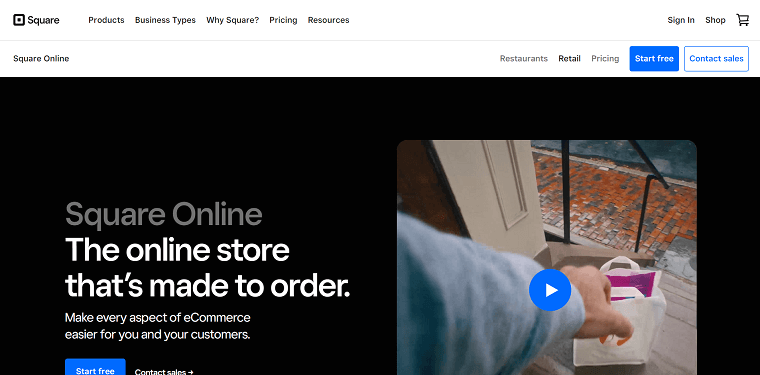
Square Online is a platform that allows users to create an online store, manage orders, and process payments. It is designed to be user-friendly and mobile-optimized, and integrates with Square's in-person point-of-sale system.
It offers a range of features, including customizable templates, product variants, inventory management, and integration with popular shipping carriers.
- Integrated with Square's in-person point-of-sale system
- Mobile optimized
- Range of features
- No support for digital products
- Transaction fee
- Limited customization options
8. Ecwid
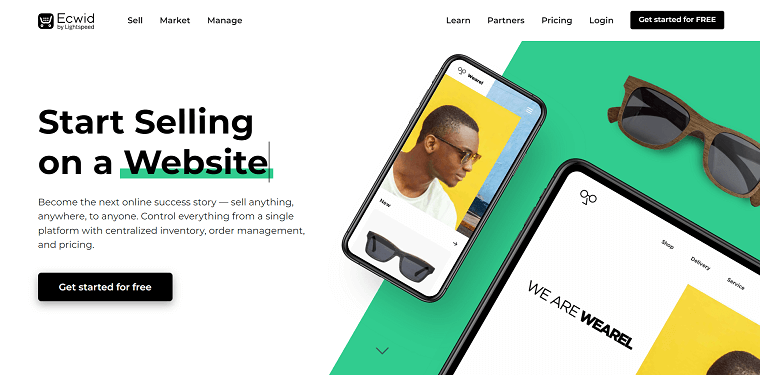
Ecwid is a cloud-based e-commerce platform that allows users to create an online store and sell products through multiple channels, including their own website, social media, and online marketplaces such as Amazon and eBay.
It offers a range of features, including customizable templates, product variants, inventory management, and integration with popular shipping carriers. Ecwid is designed to be user-friendly and mobile-optimized, and offers a range of integrations with other tools and platforms.
- Multiple sales channels
- Multilingual and multicurrency support
- Wide range of integrations
- No support for digital products
- Limited customizability options
- Transaction fee
Final Thoughts
In conclusion, there are many e-commerce platforms available for businesses looking to set up an online store and sell products internationally. These platforms offer a range of features and services to help businesses manage their e-commerce operations, including customizable templates, product variants, inventory management, and integration with popular shipping carriers.
When choosing an e-commerce platform, it is important to consider your specific needs and goals, and to research and compare different options to find the best fit for your business.












 Company
Company
 Why Choose DSers
Why Choose DSers
 Blog
Blog
 Help Center
Help Center




 Live Chat
Live Chat